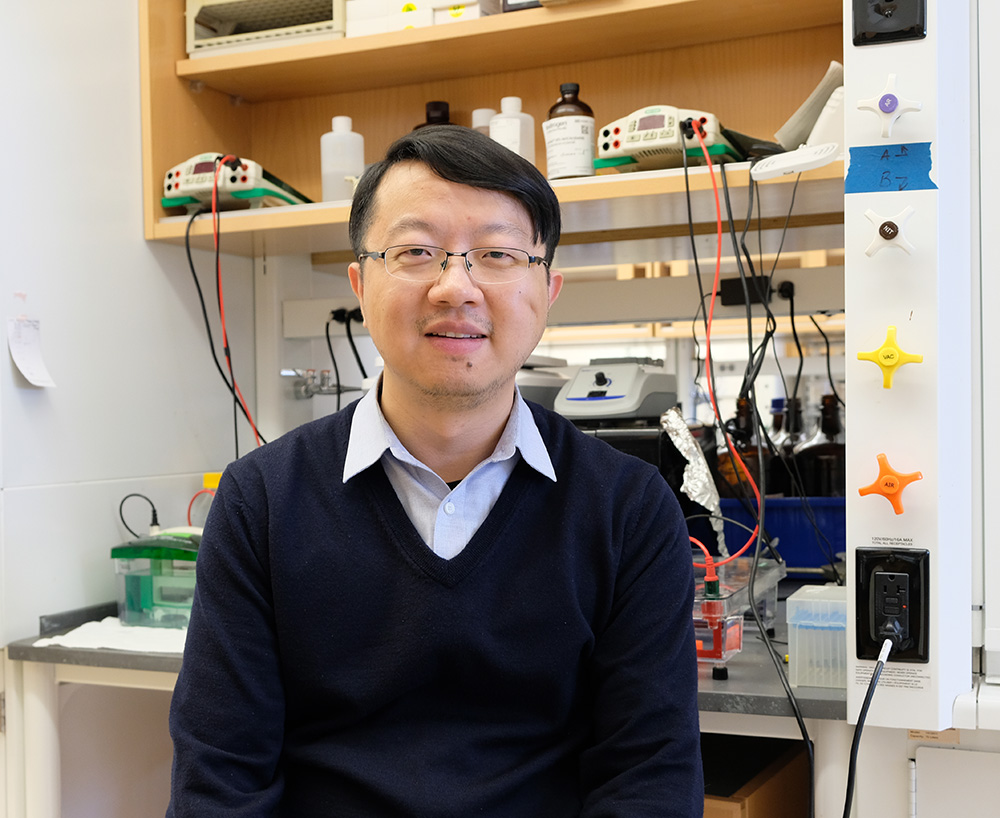With significant new federal funding, the College of Science and Technology is advancing multidisciplinary research in cancer treatment. In July, Ross Wang, associate professor in the Department of Chemistry, and his laboratory group were awarded a $2.155m grant from the National Institute of General Medical Sciences (NIGMS) and a $177,000 R03 pilot grant from the National Cancer Institute (NCI). Across these multiple studies the shared goal is to invent and develop molecular toolkits to better understand and treat diseases and the cellular events associated with them.
The NIGMS Maximizing Investigators’ Research (MIRA) award represents a five-year renewal of an existing grant, funding mechanism studies of proteins and protein-protein interactions related to human diseases using chemical tools. Specifically, the studies focus on breast cancer, prostate cancer and T cell-mediated immunological disorders.
“We are looking to apply our unique bioorthogonal chemistry labeling strategy to proteins in the patient samples (e.g., saliva, serum, urine) that we’ll acquire clinically from Fox Chase in the long run,” said Wang. “We aim to use our chemical probes coupled with cutting-edge mass spectrometry and bioanalytical analysis to identify protein-protein interactions as novel therapeutic targets for cancer and inflammatory disorders.”
The NCI grant, heralding the lab’s first foray into translational research, funds a collaboration with Fox Chase Cancer Center and Temple’s Fels Cancer Institute for Personalized Medicine. Working with biomedical researcher Vladimir Kolenko, MD PhD, and preclinical animal model expert Annmarie Pimble, Wang is hoping to invent small molecule or macromolecule inhibitors to target transcription factors such as Myc which are traditionally considered ‘undruggable’ but play pivotal roles in oncology development. The agents they hope to develop can target drug-resistant cancer types—prostate cancer as well as solid tumors and hematologic cancers, such as leukemia and lymphoma, among others.
“Our lab has developed a peptide chemical stapling platform which empowers us to rationally design and generate peptides and other molecular agents that can target these disease-related protein-protein interactions and that also possess satisfactory cellular and tissue uptake,” Wang said.
The collaborations naturally evolved out of Wang’s work in Fox Chase’s Cancer Signaling and Microenvironment research program and its Cancer Epigenetics Institute as well as the Fels Cancer Institute. With like-minded colleagues pursuing similar questions, he found ideal collaborators for these interdisciplinary projects.
“Both grants are using molecular engineering skillsets spanning from chemical synthesis, protein engineering, to bioanalytical imaging and mass spectrometric analysis,” he said. “Together, these grants facilitate our lab to continuously push the boundaries of chemistry, biology, and medicine, to create technologies that understand and further prevent disease, enable earlier interventions, and personalize patient treatments. In addition, the new research supports will help us continue our program’s mission to teach and educate our students as future research scholars.”


